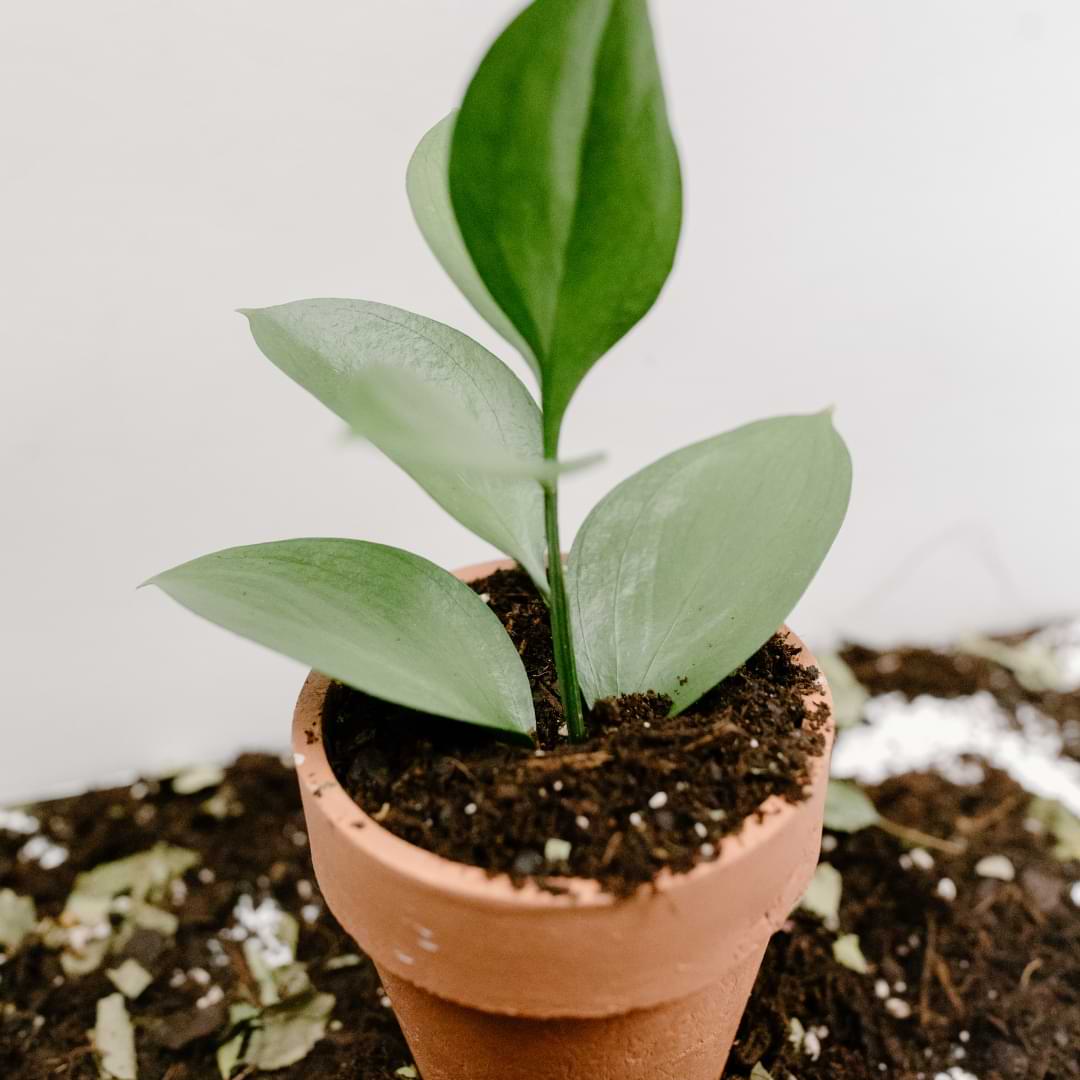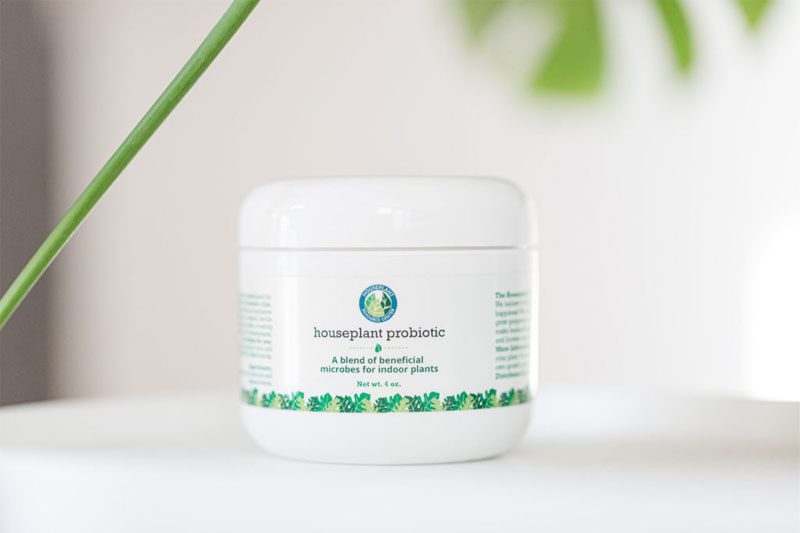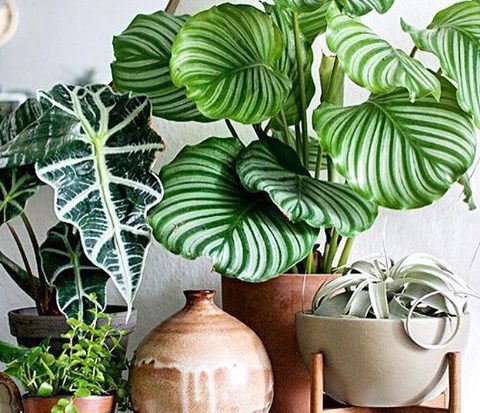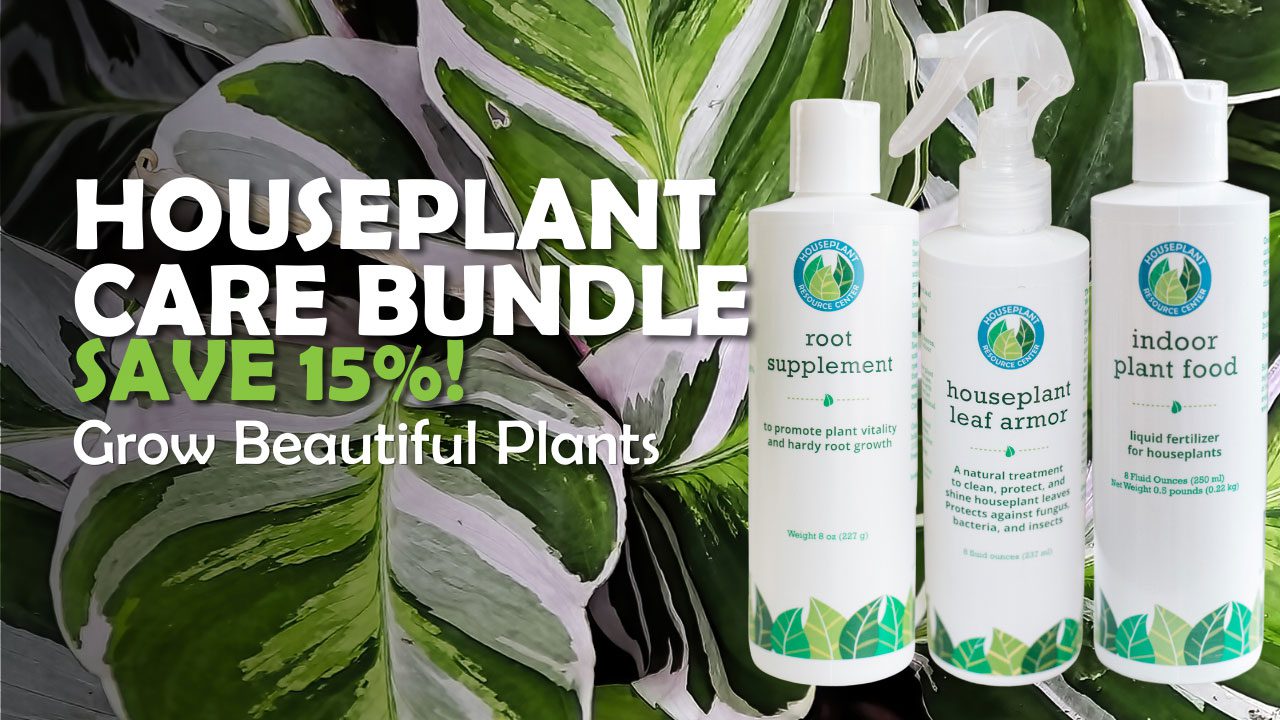Just as it’s important to add nutrients to potting mix in the form of fertilizer, when you add beneficial microbes to soil as a probiotic supplement or other soil amendments can help you grow healthier, more beautiful houseplants.
You’ve probably heard the terms microflora, microfauna, microbiome, etc., thrown around over the past few years, often in relation to human gut health. But plant health also depends on a thriving microbiome in the soil! Adding these beneficial microbes to soil can make all the difference in the health and appearance of your plants.
Lots of exciting new research is exploring the role of microorganisms in soil and their effect on everything from plant nutrient uptake to root growth. A healthy variety of microbes in the soil can greatly improve soil fertility, which can increase yield and growth with less fertilizer while also fortifying plants against pests and disease with fewer pesticides and antibiotics. Obviously, this has amazing implications for agriculture and the farming industry, but this is good news for your houseplants too!
Houseplants face different challenges than crops planted outdoors. Your houseplants only have access to the soil in their pots, and if that soil is old (or was of poor quality to begin with), it may not contain sufficient nutrients or a well-balanced microbiome to keep the plant healthy.
Here’s everything you need to know about adding probiotics to soil to grow healthy houseplants.
Table of Contents
Why Add Microbes to Soil?
Microbes play different roles in soil fertility and plant health, but in general, these tiny organisms aid in nutrient and water uptake, stimulate root growth, fight off harmful microorganisms, and fortify plants against pests and parasites.
Basically, microbes can aid in just about every physical process a plant carries out. That’s a big deal!
Do I Need to Add Microbes to Potting Compost?
You’re probably wondering whether you need to start adding microbes to your soil pronto. The answer is…maybe. It depends on the current condition of your soil.
Fresh, high-quality soil might already have a healthy microbiome and not need supplements or amendments yet. If you buy a quality potting mix like our Premium Fiddle Leaf Fig Soil or Monstera Soil that contains cultured ingredients like fresh compost, worm castings, manure, etc., you probably won’t need to worry about adding microbes for at least a few months.
If you’re making your own potting mix, be sure to include plenty of nutrient-dense materials like these.
However, if you’re using cheaper soil or if your plant has been in the same soil for more than a few months, you might want to think about using a probiotic supplement. A growing plant can easily use up all the nutrients in its potting mix in a couple of months, which means the helpful microbes can start to die off because they need nutrients too!
After your plant has been in its soil for about three months, you can start adding probiotics to keep that microbiome flourishing.
What Microbes Can Be Beneficial to Soil?
There are 5 basic types of microbes that improve soil fertility and benefit your plants:
- Actinomycetes: Similar to bacteria and originally thought to be a type of fungi, some of these microorganisms can be harmful and actually attack the roots of the plant. But the helpful actinomycetes can actually act as antibiotics to kill off harmful bacteria that lead to root rot and other diseases.
- Bacteria: These break down nutrients into a bioavailable form that can be easily absorbed by the roots. This is crucial for nutrient uptake, growth, energy transport, and other physical processes essential to the plant’s survival.
- Fungi: These also help with nutrient breakdown as well as water uptake.
- Protozoa: These coexist with bacteria and also consume some bacteria. When they consume bacteria, they release more nutrients into the soil.
- Nematodes: Some of these tiny worms are helpful to plants and some are harmful. The helpful ones tend to eat the harmful ones that attack the plant. The helpful nematodes also release nutrients into the soil through their digestion.
How Do Microorganisms Increase Soil Fertility?
These beneficial microorganisms develop a symbiotic relationship with the plant (usually through nutrient sharing or by consuming predators the plant attracts) and essentially help plants absorb nutrients that are already available in the soil.
Microbes break down or pre-digest organic matter into simpler forms plants can use. Organisms may also release more nutrients into the soil as they consume and digest other microbes or substances in the soil, which can improve the nutrient content of the soil.
This is why it can be so helpful to use a gentle liquid fertilizer as well as a probiotic supplement. The right microbiome can make your fertilizing efforts much more effective.
How Are Microbes Beneficial to Plants?
Microbes can play many different roles in soil. Here are just a few:
- Producing hormones similar to plant rooting hormones, which can prompt root growth.
- Improving nutrient absorption by breaking vitamins and minerals down into more bioavailable forms.
- Increasing water uptake.
- Adding nutrients to the soil through their digestive process.
- Improving immunity to disease and pests.
- Fighting off harmful bacteria, fungi, and nematodes.
How to Add Beneficial Microbes to Soil
There are several ways to add microbes to soil, through both commercial products and DIY methods.
Add Organic Compost
Compost is a rich source of both nutrients and beneficial microbes that break down organic matter. Adding compost to your homemade potting mixes or mixing it into the top layer of soil from time to time can provide your plants with a helpful boost of both!
Supplement With Probiotics
There are also plenty of quality plant probiotic supplements on the market that make it easy to keep your soil microbiome thriving.
We love our Houseplant Probiotic because it’s all-natural and helpful to the environment rather than hurtful. It’s also super easy to use! Just mix a few tablespoons in the top layer of your plant’s soil each month to keep the soil teeming with helpful microorganisms.
You can also find recipes for DIY probiotic supplements out there, often utilizing cultured molasses. These take a bit of work, but they’re a lot of fun if you want to try something all-natural and like to be more hands-on with what goes into your plant’s soil.
Avoid Pesticides
Another easy way to keep your soil’s microbiome healthy is to avoid using pesticides as much as possible, because these can kill off beneficial microbes.
Healthy, fertile soil will help protect a plant from insects, and there are also natural ways to ward off pests without resorting to harsh chemicals.
This might include removing insects manually by hand, with a hose or sprayer, or with a lint roller. Releasing natural predators like ladybugs can be an excellent alternative to pesticides. Neem oil, or our Leaf Armor Spray can also be an effective treatment that won’t throw your soil microbiome out of whack.
Read more about treating insect infestations the natural way: Household Insect Control: How to Deal With Common Pests.
Do I Need to Feed Soil Microbes?
Microbes in the soil need nutrients in order to stay alive. The good news is that in nature, healthy soil typically comes with both.
If you’re using organic compost, you won’t have to worry about feeding microbes.
If you’re using a probiotic supplement, we recommend using fertilizer in conjunction with your microbial supplement. This will provide both the plant and the microbes with plenty of nutrients and keep both thriving and in balance.
Can Soil Have Too Many Microbes?
This is tricky. The short answer is no. Your soil can only support so many microbes; but you can have the wrong balance of microbes, meaning that your soil contains more harmful than helpful microbes.
It can be tricky to diagnose this, however, since all the symptoms can have other causes.
If your plant is struggling with issues like bacterial or fungal root rot, parasites, leaf discoloration, or stunted growth, an overgrowth of harmful soil microbes could be part of the puzzle. (Though the issue could also have to do with inappropriate watering, too much or too little light, nutrient deficiency, etc.) To make matters even more complicated, an insufficient or imbalanced microbiome can also cause or exacerbate those issues.
If you notice these problems and determine that light, watering, humidity, and temperature aren’t part of the problem, you may want to consider the soil quality. If you see signs of disease like root rot or fungal growth on the soil, your best bet is probably to repot the plant into fresh, nutritious soil and a clean pot. Within a couple months, start fertilizing and adding probiotics to the soil. Sometimes the best course of action is to start fresh.
If your plant simply isn’t thriving but doesn’t appear to be diseased, try adding a healthy probiotic like our Houseplant Probiotic to the soil and see if that improves the situation.
List of Beneficial Bacteria for Plants
There are thousands of different species of helpful bacteria you might find in fertile soil. Here are just a few of the most helpful and most common bacterial species you’ll find in plant probiotic supplements and healthy soil. These bacteria perform a variety of functions, from enabling nitrogen uptake to killing off fungus gnat larvae to regulating plant growth hormones.
- Pseudomonas
- Azospirillum
- Streptomyces diastatochromogenes
- Bacillus thuringiensis
- Various Rhizobium species such as Bradyrhizobium, Allorhizobium, Sinorhizobium, Mesorhizobium
- Enterobacter
- Klebsiella
Final Thoughts on Adding Microbes to Plant Soil
This might seem super complicated—especially when you start delving into various species of bacteria, fungi, etc., but nurturing your soil’s microbiome doesn’t have to be difficult or time-consuming.
Just being aware that these organisms are at play can help you take better care of your plant by being more mindful of the soil conditions and considering that as a factor when troubleshooting issues.
In practice, keeping your soil healthy may only take a few minutes, tops, each month, especially if you use a quality supplement.
It can’t get any simpler than this. Simply mix a few tablespoons of these granules into the top layer of soil every month and you’re done! This wonderful supplement contains a wide variety of bacteria, fungi, protozoa, and other microbes thanks to our special method of processing cultured dairy manure and straw. Your plant will grow taller, healthier, and more beautiful with bigger leaves, brighter colors, and a strong root system.
You’ll wonder how you ever grew plants without probiotics!
Have more questions about your soil and other houseplant issues? For additional help and support, join our online community and more!
Houseplants for Millennials Book





